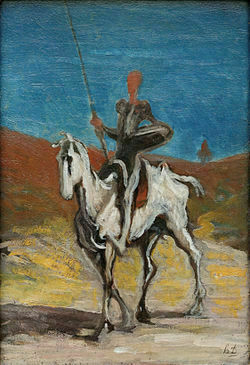June Reading: "Don Quixote de la Mancha" by Miguel de Cervantes
Currently reading: Don Quixote by Miguel de Cervantes. 📚
I’m halfway through Part I of Cervantes' humorous tale about the delusional-but-endearing Don Quixote and his long-suffering companion, Sancho Panza. Considered by many to be the prototype of the modern novel, Don Quixote blends romance, poetry, and satire to expose the excesses of a fading fictional genre (the medieval romance) and one man’s obsession with knight-errantry.
I’m pleased to be reading it with my dear friend and literary partner, Laura, in anticipation of tackling Deceit, Desire, and the Novel by Rene Girard later this summer. Laura is a novelist while my interests lean more towards literary criticism. Hoping to get more familiar with the novel’s historical roots, we both felt it was high time to add Cervantes' great work to the “Finished Reading” bookshelf.
I’m using Samuel Putnam’s translation from the 1949 Modern Library edition. He had some great insights in his introductory notes I’d like to share:
How Don Quixote came to be written
[S]purred on by want, Cervantes began the work…to compose a tale that would have a widely popular appeal…a parody or satire, not on the institution of chivalry, as has wrongly been assumed in the past, but on those romances dealing with knights-errant and their fantastic adventures that, having enjoyed so tremendous a vogue in the sixteenth century, had some while since begun to fall into disrepute. (Putnam, xxviii)
On the novel’s universal appeal
Don Quixote [has] its rightful place among the classics as a serious work that not only is important from the point of view of the history of the novel, but that holds a deeper meaning for those that would seek it, while at the same time losing nothing of its appeal as a masterpiece of humor. (Putnam, xiv)
Don Quixote becomes nothing less that a novelistic treatment of the essential nature of human life and man’s greatest metaphysical problem: that of illusion and reality. It is a problem as old as Plato⚊and a good deal older⚊and as new as Jean-Paul Sartre. (Putnam, XXIX)
So far, my impression is very favorable. While I’ve encountered more than a few belly laughs in the first two dozen chapters or so, I’m more intrigued by the figures of our delusional would-be knight and his faithful squire as they begin to reveal deeper wells of pathos and humanity. It will be fun to see how it all turns out. Unfortunately, I don’t expect that either of us will make it to Part II this month, but perhaps we can save the sequel for next summer. ⛱
